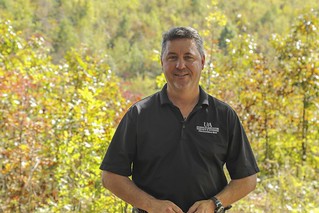Oct. 20 tour to feature forest management for water quality, wildlife
By Mary Hightower
U of A System Division of Agriculture
Sept. 30, 2022
Fast facts
- No cost to attend event.
- Register by Oct. 14, by calling 870-793-7432
(294 words)
(Newsrooms: with file art https://flic.kr/s/aHBqjA8a2F)
LITTLE ROCK — An Oct. 20 forestry tour at the Livestock and Forestry Research Station in Batesville will highlight forest management practices that will promote forest production and wildlife habitat and improve water quality and help wildlife in upland hardwoods.
The tour, “Productive Forests Protecting Water,” begins at 9 a.m. and runs until about 2:30 p.m. Lunch will be served. There’s no cost to attend, but attendees are asked to register by Oct. 14 by calling the station at 870-793-7432. The station is located at 70 Experiment Station Drive in Batesville.
“Having a productive forest doesn’t mean you can’t also maintain water quality,” said Kyle Cunningham, associate professor-forestry for the University of Arkansas System Division of Agriculture. “This tour will show how water quality protections can be used on managed forestland.”
The tour will cover:
- Water sources and threats to water quality
- Forest management practices that promote water quality
- Managing upland forests for wildlife
- Getting the most from upland hardwood forests, including vegetation control, thinning, prescribed fire, invasive species control and economic considerations.
Among the speakers on the tour are Cunningham; Julia Schmidt of the Forestry Division of the Arkansas Department of Agriculture; John Pennington, extension water quality instructor; Rob Willey, habitat program coordinator for the Arkansas Game and Fish Commission; and Mike McGowan, statewide forester for the Arkansas Agricultural Experiment Station.
The program is presented by the Arkansas Forest Resources Center, managed jointly by the division of Agriculture’s Agricultural Experiment Station and the University of Arkansas at Monticello. The Livestock and Forestry Research Station is operated by the Arkansas Agricultural Experiment Station the research arm of the Division of Agriculture.
The field tour is offered in collaboration with the Arkansas Forestry Association, and funding partners: the Arkansas Department of Agriculture Forestry Division, and the Natural Resources Conservation Service, part of the U.S. Department of Agriculture.
To learn about extension programs in Arkansas, contact your local Cooperative Extension
Service agent or visit www.uaex.uada.edu. Follow us on Twitter and Instagram at @AR_Extension. To learn more about Division
of Agriculture research, visit the Arkansas Agricultural Experiment Station website: https://aaes.uada.edu. Follow on Twitter at @ArkAgResearch. To learn more about the Division of Agriculture,
visit https://uada.edu/. Follow us on Twitter at @AgInArk.
About the Division of Agriculture
The University of Arkansas System Division of Agriculture’s mission is to strengthen agriculture, communities, and families by connecting trusted research to the adoption of best practices. Through the Agricultural Experiment Station and the Cooperative Extension Service, the Division of Agriculture conducts research and extension work within the nation’s historic land grant education system.
The Division of Agriculture is one of 20 entities within the University of Arkansas System. It has offices in all 75 counties in Arkansas and faculty on five system campuses.
The University of Arkansas System Division of Agriculture is an equal opportunity institution. If you require a reasonable accommodation to participate or need materials in another format, please call 870-793-7432 as soon as possible.
# # #
Media contact: Mary Hightower, mhightower@uada.edu
